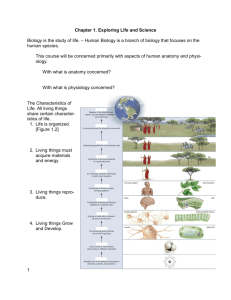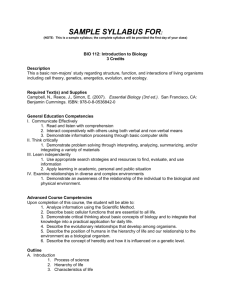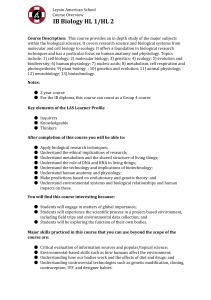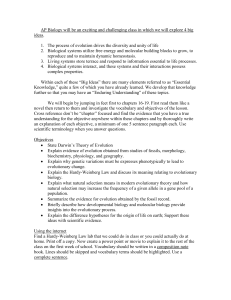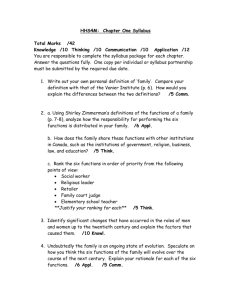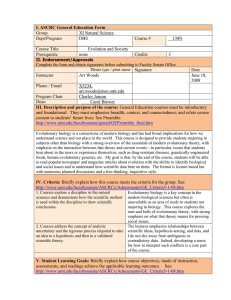BIOL 1407 General Biology II - Wharton County Junior College
advertisement
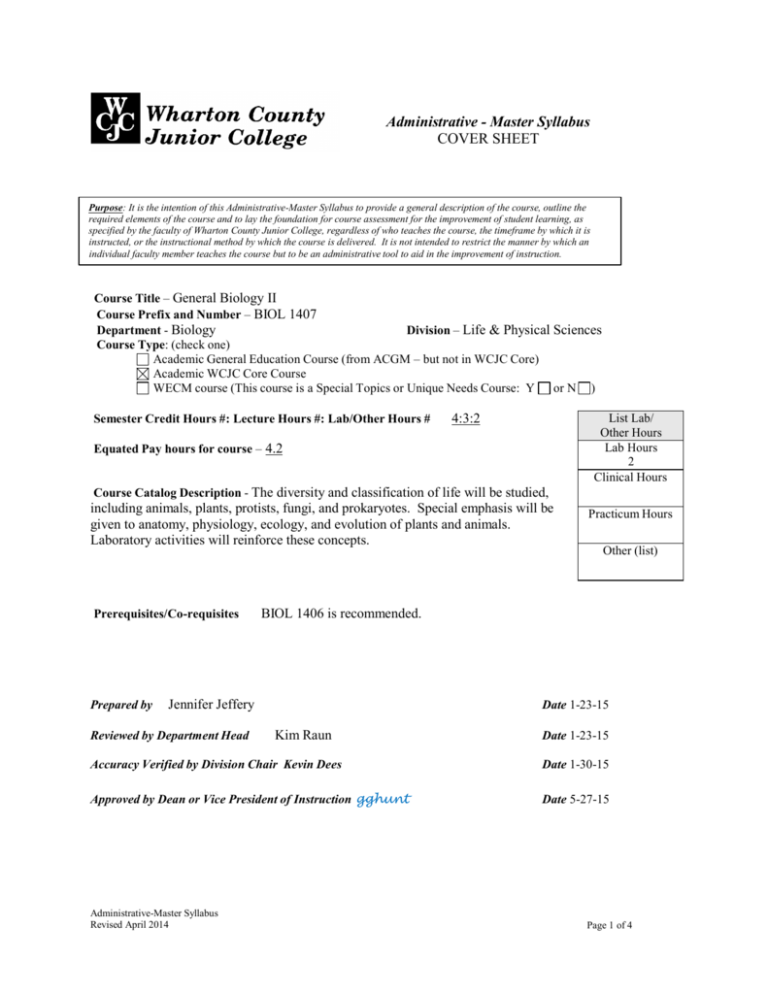
Administrative - Master Syllabus COVER SHEET Purpose: It is the intention of this Administrative-Master Syllabus to provide a general description of the course, outline the required elements of the course and to lay the foundation for course assessment for the improvement of student learning, as specified by the faculty of Wharton County Junior College, regardless of who teaches the course, the timeframe by which it is instructed, or the instructional method by which the course is delivered. It is not intended to restrict the manner by which an individual faculty member teaches the course but to be an administrative tool to aid in the improvement of instruction. Course Title – General Biology II Course Prefix and Number – BIOL 1407 Department - Biology Division – Life & Physical Sciences Course Type: (check one) Academic General Education Course (from ACGM – but not in WCJC Core) Academic WCJC Core Course WECM course (This course is a Special Topics or Unique Needs Course: Y or N ) Semester Credit Hours #: Lecture Hours #: Lab/Other Hours # 4:3:2 List Lab/ Other Hours Lab Hours 2 Clinical Hours Equated Pay hours for course – 4.2 Course Catalog Description - The diversity and classification of life will be studied, including animals, plants, protists, fungi, and prokaryotes. Special emphasis will be given to anatomy, physiology, ecology, and evolution of plants and animals. Laboratory activities will reinforce these concepts. Prerequisites/Co-requisites Prepared by Other (list) BIOL 1406 is recommended. Jennifer Jeffery Reviewed by Department Head Practicum Hours Date 1-23-15 Kim Raun Date 1-23-15 Accuracy Verified by Division Chair Kevin Dees Date 1-30-15 Approved by Dean or Vice President of Instruction gghunt Date 5-27-15 Administrative-Master Syllabus Revised April 2014 Page 1 of 4 Administrative - Master Syllabus I. Topical Outline – Each offering of this course must include the following topics (be sure to include information regarding lab, practicum, clinical or other non-lecture instruction): LECTURE TOPICAL OUTLINE 1. Evolution A. History of evolutionary thought B. Darwinian revolution and natural selection C. Modern evolutionary synthesis D. Evidence of evolution (fossil records, geologic change, microevolution vs. macroevolution E. Population genetics: natural selection, genetic drift and gene flow F. Speciation and extinction 2. Biological Classification A. Taxonomy B. Phylogenetics 3. Organismal Survey (consideration will be given to anatomy, physiology, reproduction, ecology and evolutionary trends) A. Prokaryotes B. Protists C. Fungi D. Plants 1. Nonvascular plants, seedless vascular plants & seed plants 2. Angiosperm anatomy & life cycle E. Animals 1. Phyla: Porifera, Cnidaria, Platyhelminthes, Nematoda, Annelida, Mollusca, Arthropoda, Echinodermata & Chordata 2. Role of organ systems on maintaining physiology and homeostasis Administrative-Master Syllabus Revised April 2014 Page 2 of 4 LAB TOPICAL OUTLINE 1. Orientation, lab safety & taxonomy review 2. Protists 3. Fungi 4. Nonvascular and seedless vascular plants 5. Seed plants 6. Angiosperm anatomy (Lab practical #1) 7. Sponges, cnidarians & platyhelminthes 8. Nematodes & mollusks 9. Annelids & arthropods 10. Echinoderms & intro to chordates 11. Craniates I 12. Craniates II (Lab Practical #2) II. Course Learning Outcomes Learning Outcomes Upon successful completion of this course, students will: Methods of Assessment 1. Describe modern evolutionary synthesis, natural selection, population genetics, micro and macroevolution, and speciation. 2. Describe phylogenetic relationships and classification schemes. 3. Identify the major phyla of life with an emphasis on plants and animals, including the basis for classification, structural and physiological adaptations, evolutionary history, and ecological significance. 4. Describe basic animal physiology and homeostasis as maintained by organ systems. 5. Compare different sexual and asexual life cycles noting their adaptive advantages. 6. Illustrate the relationship between major geologic change, extinctions, and evolutionary trends. 7. Apply scientific reasoning to investigate questions, and utilize scientific tools such as microscopes and laboratory equipment to collect and analyze data. 8. Use critical thinking and scientific problemsolving to make informed decisions in the laboratory. 9. Communicate effectively the results of scientific investigations. Exams, lab reports, essays, presentations, discussions (online or in-class), group activities, graph/table/chart presentations or post-tests Administrative-Master Syllabus Revised April 2014 Page 3 of 4 III. Required Text(s), Optional Text(s) and/or Materials to be Supplied by Student. Text: Reece, et al. Campbell Biology. Pearson. Current edition Lab Manual: Wharton County Junior College Department of Biology. Lab Exercises: General Biology II. XanEdu. Current edition. IV. Suggested Course Maximum – 36 lecture; 24 lab V. List any specific spatial or physical requirements beyond a typical classroom required to teach the course. Laboratory classroom required VI. Course Requirements/Grading System – Describe any course specific requirements such as research papers or reading assignments and the generalized grading format for the course Lecture Average: Exam average (3-4 exams) Other (homework, quizzes, projects, etc.) Laboratory Average* 55% 30-55% 0-25% 25% A B C D F 100-90 89-80 79-70 69-60 Below 60 Final Exam (includes at least 50% comprehensive material) 20% Total 100% *Laboratory Average calculated as follows: Quiz Average (best 6 of 9 weekly quizzes) Lab Practical #1 Exam Lab Practical #2 Exam VII. 50% 25% 25% Curriculum Checklist - Academic General Education Course (from ACGM – but not in WCJC Core) No additional documentation needed - Academic WCJC Core Course Attach the Core Curriculum Review Forms • Critical Thinking • Communication • Empirical & Quantitative Skills • Teamwork • Social Responsibility • Personal Responsibility - WECM Courses If needed, revise the Program SCANS Matrix & Competencies Checklist. Administrative-Master Syllabus Revised April 2014 Page 4 of 4
